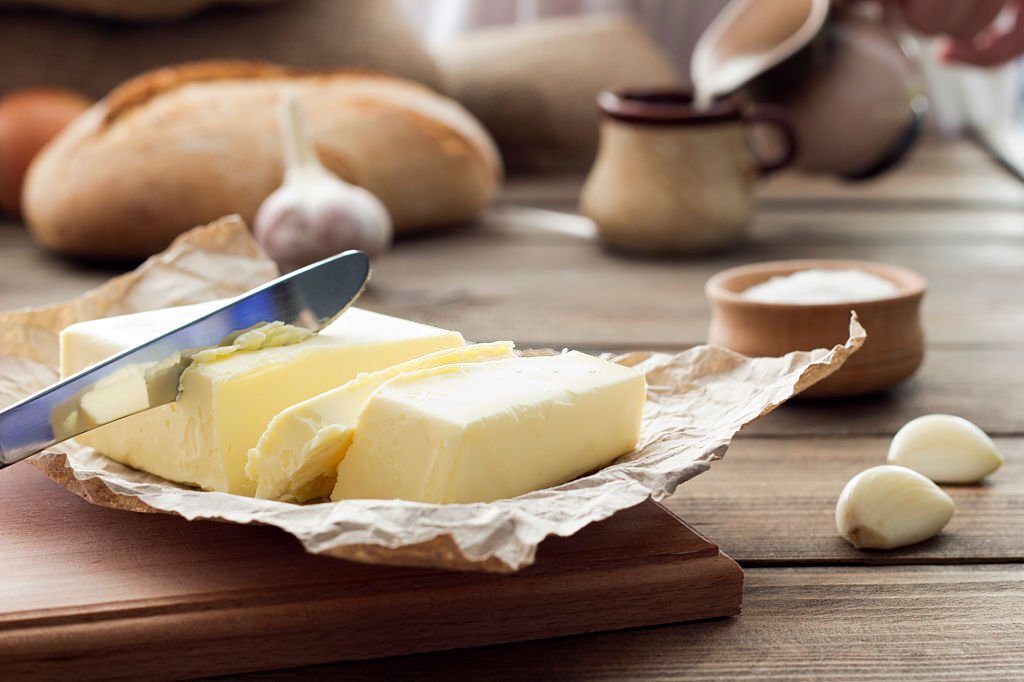Carbohydrates, oh how they fuel our bodies and bring joy to our taste buds! These macronutrients are the body's primary source of energy, providing the fuel necessary for our daily activities.
They come in various forms, including grains, fruits, vegetables, and even dairy products.
Speaking of dairy, let's explore the world of butter and its nutritional profile.
But before we dive into that golden goodness, let's first understand the role of carbohydrates and how they affect our bodies.
Carbohydrates: The Powerhouses of Energy
Carbohydrates are one of the three main macronutrients, alongside fats and proteins. They are a primary source of energy for our bodies and play a vital role in various physiological functions.
When we consume carbohydrates, they are broken down into glucose, a form of sugar that enters our bloodstream.
Glucose serves as the body's preferred energy source, powering our muscles, brain, and other organs.
Carbohydrates can be categorized into two main types: simple and complex.
Simple carbohydrates, also known as sugars, are found in foods like fruits, honey, and processed sweets. They provide quick bursts of energy but can cause a rapid spike in blood sugar levels.
On the other hand, complex carbohydrates, commonly found in whole grains, legumes, and starchy vegetables, are digested more slowly, providing a steady and sustained release of energy.
It's important to note that not all carbohydrates are created equal. Some sources, such as whole grains, fruits, and vegetables, contain additional nutrients like fiber, vitamins, and minerals, which contribute to overall health.
Now that we have a basic understanding of carbohydrates, the golden question is, are there carbs in butter? Let's dive in and spread the truth!
Are There Carbs in Butter?
You're probably thinking, “Butter, the holy grail of decadence, surely it must be packed with carbs!” Well, prepare to be pleasantly surprised.
Butter is primarily composed of fat and water, with negligible amounts of protein and almost no carbs. That's right, butter is as low-carb as it gets!
According to the USDA National Nutrient Database, a tablespoon of butter contains a mere 0.01 grams of carbs.
To put it into perspective, that's less than the amount of carbs you'd find in a sprinkle of fairy dust.
Now, let's compare butter to some other carb-containing foods.
A medium-sized apple, for example, packs around 25 grams of carbs, while a slice of whole wheat bread boasts about 12 grams.
So, when it comes to carbs, butter is like that cool kid who sits at the back of the class, barely making a blip on the radar.
It's the kind of food that low-carb enthusiasts rejoice over, as they can slather it on their steak without a carb care in the world.
Benefits of Butter for Low-Carb Diets
Now that we know butter is low in carbs, what are the benefits of including it in a low-carb diet?
People who follow low-carb eating plans like keto, paleo, or Atkins often rely on fats as a significant energy source, and butter fits the bill perfectly.
Here are some reasons why butter can be a friend to those following a low-carb lifestyle.
Flavorful and Versatile
Butter is a culinary chameleon, enhancing the taste and texture of countless dishes.
Its rich, creamy flavor can transform a simple piece of toast into a decadent treat, and its velvety smoothness can elevate sauces, soups, and baked goods to new heights of deliciousness.
With butter, you can add a touch of luxury and flavor to your low-carb meals, making them satisfying and enjoyable.
Nutrient Powerhouse
While butter is predominantly fat, it also contains essential vitamins and minerals that contribute to overall health.
One of the standout nutrients in butter is vitamin A, which plays a crucial role in maintaining healthy vision, supporting immune function, and promoting skin health.
Butter also contains vitamin D, a nutrient that is often deficient in many individuals and is essential for bone health and immune system function.
Additionally, butter provides vitamin E, an antioxidant that helps protect our cells from damage, and vitamin K2, which is important for bone health and plays a role in preventing calcium buildup in the arteries.
These nutrients work together to support various aspects of our well-being, from vision and immunity to bone strength and heart health.
Butyric Acid
Butter contains a unique fatty acid called butyric acid, which has been associated with several health benefits.
This acid is a preferred energy source for the cells lining our colon, supporting a healthy digestive system.
It also has anti-inflammatory properties and may help reduce inflammation in the gut, making it beneficial for those with certain digestive disorders.
Now that we know the benefits of incorporating butter into a low-carb diet, it's essential to understand how to use it wisely.
How to Use Butter Wisely
While butter can be a flavorful addition to your meals, it's important to remember that it's still a high-calorie food.
Consuming excessive amounts of butter can contribute to weight gain and potentially increase the risk of certain health conditions like high cholesterol and heart disease.
Here are some tips on how to use butter wisely and enjoy its goodness while maintaining a balanced diet:
- Moderation is key: While butter can enhance the taste of your dishes, it's important to use it in moderation. Remember, a little goes a long way in terms of flavor and texture.
- Opt for quality: Choose high-quality, grass-fed butter whenever possible. Grass-fed butter tends to have a richer taste and higher nutrient content compared to conventionally produced butter.
- Thinly spread and melt: Instead of slathering butter thickly on your bread or vegetables, try spreading it thinly or melting it. This allows you to distribute the flavor more evenly and reduces overall calorie intake.
- Be creative: Experiment with using butter in various ways. Instead of solely using it as a spread, try melting it over popcorn, adding a pat to your scrambled eggs, or incorporating it into homemade sauces or soups. These small additions can amplify the taste without going overboard on calories.
- Balance it out: Remember to balance your intake of butter with other nutrient-dense foods. Including a variety of vegetables, lean proteins, whole grains, and healthy fats in your meals will provide a well-rounded and balanced diet.
While butter can be a delicious addition to a low-carb diet, it's essential to be mindful of portion sizes and overall calorie intake.
By using butter wisely and incorporating it into a balanced eating plan, you can enjoy its flavorsome benefits without compromising your health.
Conclusion
In conclusion, the answer to the burning question, “Are there carbs in butter?” is a resounding no!
Butter is predominantly composed of fat and water, with negligible amounts of carbohydrates.
It is a low-carb and low-glycemic food, making it suitable for individuals following low-carb diets such as keto, paleo, or Atkins.
Butter offers a range of benefits for those on a low-carb journey. Its delightful flavor, versatility, and nutrient content make it a valuable addition to meals.
With nutrients like vitamin A, vitamin D, vitamin E, vitamin K2, and butyric acid supporting various aspects of health, including vision, immunity, skin, bone, digestion, and inflammation, butter proves to be more than just a flavorful ingredient.
However, it's crucial to exercise moderation when it comes to butter consumption. While it can be a delicious addition to your meals, it is still high in calories.
Consuming excessive amounts of butter can lead to weight gain and potentially contribute to health issues like high cholesterol and heart disease.
To use butter wisely, consider spreading it thinly on toast or vegetables, melting it over popcorn or eggs, or incorporating it into sauces or soups.
By doing so, you can savor its flavor while keeping your overall calorie intake in check.
Remember that a balanced diet is key.
While butter can enhance the taste of your meals, it's important to complement it with a variety of nutrient-dense foods like vegetables, lean proteins, whole grains, and healthy fats.
This will ensure that you receive a wide range of essential nutrients while enjoying the indulgence of butter.
Butter is a low-carb food that can be enjoyed in moderation as part of a healthy diet.
It adds richness and flavor to dishes while providing essential nutrients.
So go ahead and savor that pat of butter, knowing that it can be a delicious and nutritious addition to your low-carb lifestyle.
We hope this article has answered your burning question about carbs in butter and provided valuable insights into its benefits and usage.
Remember, everyone's dietary needs may vary, so it's always best to consult with a healthcare professional or nutritionist for personalized advice.


